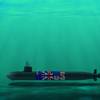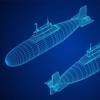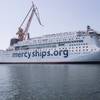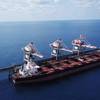IMO Will Focus on Security Issues
Security issues to fore at IMO safety meeting Maritime security issues are high on the agenda of IMO's Maritime Safety Committee (MSC), which meets for its 75th session from May 15 to 24 , as Member States prepare for a Diplomatic Conference on Maritime Security scheduled for December 2002, at which any new or amended legislation could be adopted.
Other major issues to be tackled include the adoption of proposed amendments to the International Convention for the Safety of Life at Sea (SOLAS), 1974, as amended; ongoing work on the safety of bulk carrier ships and large passenger vessels; implementation of the revised STCW Convention; and the adoption of new and amended ships routeing measures.
The meeting will take place at IMO Headquarters in London from May 15th to 24th 2002, under the chairmanship of Tom Allan from the United Kingdom.
Security
"Prevention and suppression of acts of terrorism against shipping" was added to the agenda for the MSC's 75th session after the IMO Assembly in November 2001 adopted resolution A.924(22), Review of measures and procedures to prevent acts of terrorism which threaten the security of passengers and crews and the safety of ships, following a submission through the Council to the Assembly by IMO Secretary-General Mr. William A. O'Neil.
The resolution calls for a review of the existing international legal and technical measures to prevent and suppress terrorist acts against ships and improve security aboard and ashore in order to reduce any associated risk to passengers, crews and port personnel on board ships and in port areas and to the vessels and their cargoes.
The MSC will review recommendations and proposals on maritime security, including the outcome of discussions during the Intersessional Working Group on Maritime Security (ISWG), which met from February 11-15 2002, as well as the outcome of discussions on the issue in other IMO bodies.
The ISWG produced a series of recommendations for further elaboration by the MSC 75 as well as other IMO bodies, including the following proposals:
· An accelerated implementation schedule for Automatic Identification Systems on existing cargo ships
· Amendments to SOLAS chapter XI, including a new proposed International Code for the Security of Ships and Port Facilities
· Proposed new requirements for ship security plans, Ship Security Officer and Company Security Officer
· Proposed new requirements for Port Security Officer, port facility security plans and port vulnerability assessment
· Urgent action on a revised seafarer identification document by ILO
· The desirability of transparency of ownership and control of the ship
· Providing a capability for seafarers to activate an alarm in the case of a terrorist attack
· Inspection of containers and other cargo transport units
· Maritime security equipment to prevent unauthorized boarding in ports and at sea
· Technical Co-operation - Capacity building for maritime security
· Long-term goals
The Legal Committee will report on its work to review the 1988 Convention for the Suppression of Unlawful Acts Against the Safety of Maritime Navigation (SUA Convention) and its related Protocol. The Legal Committee will also report on its consideration of how best to define the terms "ownership" and "control" of ships in the context of maritime security.
Amendments to SOLAS
The expanded Committee will consider, for adoption, draft amendments to the International Convention for the Safety of Life at Sea (SOLAS), 1974, as amended, to chapters II-1, IV, V, VI and VII, with anticipated entry into force likely to be set for 1 January 2004.
The draft amendments relate to the following:
Making the IMDG Code mandatory - the draft amendments to SOLAS chapters VI (Carriage of Cargoes) and VII (Carriage of Dangerous Goods) would make parts of the International Maritime Dangerous Goods Code (IMDG Code) mandatory. The MSC is also expected to adopt the IMDG Code (Amendment 31-02) in a mandatory form. However, as MSC has agreed, the provisions of the following parts of the Code would remain recommendatory:
chapter 1.3 (Training);
chapter 2.1 (Explosives, Introductory Notes 1 to 4 only);
chapter 2.3, section 2.3.3 (Determination of flashpoint only);
chapter 3.2 (columns 15 and 17 of the Dangerous Goods List only);
chapter 3.5 (Transport schedule for Class 7 radioactive material only),
chapter 5.4, section 5.4.5 (Multimodal dangerous goods form), insofar as layout of the form is concerned;
chapter 7.3 (Special requirements in the event of an incident and fire precautions involving dangerous goods only).
The mandatory IMDG Code (Amendment 31-02) also incorporates certain changes relating to specific products, as well as relevant elements of the amendments to the UN Recommendations on the Transport of Dangerous Goods, Model Regulations adopted by the UN Committee of Experts on the Transport of Dangerous Goods at its twenty-first session in Geneva from 4 to 13 December 2000.
Access to spaces in cargo areas of oil tankers and bulk carriers - the revised draft regulation II-1/12-2in SOLAS chapter II-1 (Construction - structure, sub-division and stability, machinery and electrical installations), Part B (Subdivision and stability), is intended to ensure that vessels can be properly inspected throughout their lifespan, by designing and building the ship to provide suitable means for access. Without adequate access, the structural condition of the vessel can deteriorate undetected and major structural failure can arise.
The regulation would require each space within the cargo area to be provided with a permanent means of access to enable, throughout the life of a ship, overall and close-up inspections and thickness measurements of the ship's structures to be carried out by the Administration, the Company, as defined in regulation IX/1 and the ship's personnel and others as necessary. Associated draft Technical provisions for means of access for inspections have been prepared and these would be mandatory under the new regulation.
The revised draft regulation was developed in response to the Erika incident and focuses on the fact that the continued adequacy of the strength of large bulk carriers and tankers depends on their being properly surveyed - which requires action at the design stage.
Currently, SOLAS chapter II-1 regulation 12-2 specifies requirements for access to spaces in the cargo area of oil tankers (only) including cofferdams, ballast tanks, cargo tanks, etc. The minimum dimensions of horizontal and vertical openings are set out. But the revised regulation is intended to address the concern that although the access to spaces in the cargo area should be sufficient to ensure their complete inspection, evidence from current ship designs suggest that a lack of detailed requirements is preventing the regulation from being fully and consistently implemented.
Updates to Chapter - IV Radiocommunications - The draft amendments to the chapter relate to changes following the full implementation of the Global Maritime Distress and Safety System (GMDSS) on 1 February 1999, which renders some of the provisions relating to implementation dates in the current chapter IV superfluous.
The draft amendments also state that a listening watch on VHF Channel 16 for distress and safety purposes should continue until 2005.
Carriage requirement for IAMSAR Manual - The proposed draft amendment to Chapter V - Safety of Navigation would require ships to carry an up-to-date copy of Volume III of the International Aeronautical and Maritime Search and Rescue (IAMSAR) Manual.
The MSC is also expected to adopt amendments to the 1988 Protocol to SOLAS, 1974, relating to updates to the Record of Equipment for the Passenger Ship Safety Certificate (Form P); Record of Equipment for the Cargo Ship Safety Radio Certificate (Form R); Record of Equipment for the Cargo Ship Safety Certificate (Form C).
Adoption of amendments to enhanced survey program
The MSC will consider the adoption of draft amendments to resolution A.744(18) - Guidelines on the enhanced program of inspections during surveys of bulk carriers and oil tankers.
The first set of draft amendments relate to surveys of bulk carriers and are intended to improve the survey procedures, in particular looking at repairs to bulk carriers and at the condition of the foremost holds. The draft amendments also propose to add new annexes 11 and 12 after annex 10:
Annex 11 Guidelines for the gauging of the vertically corrugated transverse watertight bulkhead between holds Nos.1 and 2
Annex 12 Additional annual survey requirements for the foremost cargo hold of ships subject to SOLAS regulation XII/9.1
The second set of draft amendments relate to surveys of oil tankers and include revisions of sections relating to repairs on oil tankers and to the intermediate enhanced survey. The draft amendments were proposed following proposals made after the Erika incident of December 1999 and consideration of issues relating to measures to improve the safety of oil tankers.
Piracy and armed robbery against ships
The MSC will be invited to consider issues relating to piracy and armed robbery at sea, in the context of discussions relating to maritime security in general. The latest reports of incidents of armed robbery and piracy at sea are expected to be reviewed as well as the report of the second assessment mission and regional meeting on piracy and armed robbery against ships for Latin American and Caribbean countries (held in Guayaquil, Ecuador - 25 and 26 September 2001) and an oral report on the third and last assessment mission and regional meeting for selected West African countries (Accra, Ghana, 25 and 26 March 2002).
Implementation of the revised STCW Convention
The list of Parties deemed to be giving full and complete effect to the provisions of the revised Convention on Standards of Training, Certification and Watchkeeping for Seafarers (STCW) 1978, as amended, is set to be updated when IMO Secretary-General William O'Neil submits his report on those countries whose evaluations have been completed since the previous MSC meeting, which was an extraordinary session held in November 2001 alongside the IMO Assembly's 22nd session.
The MSC will be invited to publish the names of any countries that now qualify to be added to the list.
Bulk carrier safety
The Committee will be invited to consider the outcome of work of Sub-Committees tasked with the consideration of various topics relating to bulk carrier safety and submissions by Governments and international organizations on matters arising from the reports concerning the sinking of the bulk carrier Derbyshire and on the various formal safety assessment (FSA) studies on bulk carrier safety which are now completed or nearing completion.
A working group will be established during the session to progress this matter further.
Large passenger ship safety
The safety of large passenger ships was first raised in IMO during the 72nd meeting of the MSC in May 2000, as a result of a personal initiative by Secretary-General William O'Neil. The Maritime Safety Committee (MSC) then agreed to undertake a global consideration of safety issues pertaining to these ships and a Working Group on Large Passenger Ship safety began work at the next session of the Committee (MSC 73, in November-December 2000), to review the current safety regime as it relates to large passenger ships.
At this latest session, the MSC will be invited to consider the report of a correspondence group formed to meet between sessions, as well as work carried out by a number of Sub-Committees on tasks set by the MSC. The MSC will also consider a variety of submissions by Governments and international organizations aimed at enhancing the safety of large passenger ships.
A working group will be once again be established during the session to advise the Committee on any further action needed to be taken on the issue.
Role of the human element
The MSC is expected to be invited to consider issues relating to the organization's work on the role of the human factor in maritime safety.
New and amended ships routeing measures
The MSC will be invited to consider the adoption of the following new and amended ships routing measures which were agreed by the Sub-Committee on Safety of Navigation at its 47th session in July 2000 (with entry into force six months after adoption):
New Traffic Separation Schemes (TSSs)
· Establishment of new traffic separation schemes off the Mediterranean coast of Egypt.
Amendments to existing Traffic Separation Schemes (TSSs)
· Extension to the Deep-Water Route "DW 17 m" southward into the Traffic Separation Scheme (TSS) "South of Gedser", proposed by Denmark and Germany. Due to a number of recent groundings and collisions in the area and because of the expected deep draft traffic through this route, the Sub-Committee agreed this measure constituted an urgent case. Denmark and Germany will therefore implement the extended deep-water route as an interim measure to become effective 6 January 2002, in advance of final adoption by the MSC in spring 2002.
· Modifications to the Ouessant traffic separation scheme to enhance maritime safety in the Bay of Biscay and the English Channel, proposed by France.
· Amendments to the existing traffic separation scheme "In the Approaches to Los Angeles - Long Beach", proposed by United States.
· Amendments to the existing traffic separation schemes (TSSs) "In the Strait of Juan De Fuca and Its Approaches, "In Puget Sound and Its Approaches", and to add TSSs and other routing measures "In Haro Strait, Boundary Pass, and in the Strait of Georgia", proposed by United States and Canada . The TSSs "In the Strait of Juan De Fuca and Its Approaches" were adopted by IMO on April 3, 1981, and implemented on January 1, 1982. The TSSs "In Puget Sound and Its Approaches" were adopted by IMO in December 1992, and implemented on June 10, 1993.
· Amendments to the existing traffic separation scheme in the Gulf of Finland which is located in the territorial waters of the Russian Federation (adopted by resolution A.284(VIII) on 20 November 1973) and the establishment of a new deep-water route in connection with the coming into operation of the new oil port of Primorsk, as proposed by the Russian Federation. The NAV Sub-Committee agreed this was also an urgent measure which justified an interim measure. The Russian Federation stated it would implement the measure from 1 November 2001, pending final adoption by the MSC.
Routeing measures other than TSSs
· Establishment of three mandatory no anchoring areas in the area of Tortugas. This forms part of a proposal to identify the marine area around the Florida Keys as a Particularly Sensitive Sea Area (PSSA), proposed by the United States.
· Amendment of the northernmost Area to be Avoided (ATBA) off the Florida Coast, which is also part of the proposal to identify the marine area around the Florida Keys as a PSSA, proposed by the United States.
· Amendment to the Area to be Avoided (ATBA) "Off the Washington Coast" to increase its size and extend its applicability to commercial ships of 1,600 gross tonnage and above, proposed by the United States.
· New routeing measures for an Area to be Avoided around Malpelo Island. Proposed by Colombia. This forms part of a proposal to designate the area around Malpelo Island as a PSSA.
· A new recommended two-way route in the Strait of Juan de Fuca, proposed by the United States.
· New "precautionary area" around the Terra Nova Floating Production Storage and Offloading (FPSO) vessel located on the Grand Banks of Newfoundland, proposed by Canada.
· Amendments to the notes in the description of the two existing Areas to be Avoided (ATBAs) in the region of the Shetland Islands, proposed by the United Kingdom. The new wording extends the application of the area to be avoided to tankers in ballast, stating "* all vessels over 5,000 gross tonnage, carrying, or capable of carrying oil or other hazardous cargoes in bulk should avoid the area*."
Mandatory ship reporting systems
· Establishment of a mandatory ship reporting system in Greenland Waters in accordance with the provisions of SOLAS regulation V/8-1, proposed by Denmark
· Amendment to the existing mandatory ship reporting system "Off Ushant", proposed by France.
Background
IMO is the United Nations agency concerned with safety of shipping and protection of the marine environment and is concerned with ensuring ships comply with international standards, including financial security. The Maritime Safety Committee is the highest technical body of the Organization. Delegates from all 162 member States may attend. The main function of the MSC is to consider any matter within the scope of the Organization that directly affects maritime safety. It has the power to adopt amendments to conventions, such as the Safety of Life at Sea Convention (SOLAS), Collision Regulations, Load Lines etc. It is assisted in its work by nine sub-committees which are also open to all Member States. They deal with the following subjects: Bulk Liquids and Gases; Carriage of Dangerous Goods; Solid Cargoes and Containers; Fire Protection; Radiocommunications and Search and Rescue; Safety of Navigation; Ship Design and Equipment; Stability and Load Lines and Fishing Vessel Safety; Standards of Training and Watchkeeping and Flag State Implementation.
Subscribe for
Maritime Reporter E-News
Maritime Reporter E-News is the maritime industry's largest circulation and most authoritative ENews Service, delivered to your Email five times per week










